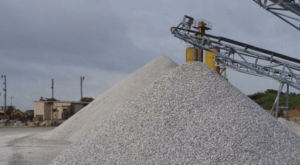Survey finds 10.2% of quarry workers don’t wear protective equipment
 A research conducted by Health and Safety Ghana (HESAG) has revealed that only 10.2 per cent of stone quarry workers in the country wore the appropriate Personal Protective Equipment (PPE).
A research conducted by Health and Safety Ghana (HESAG) has revealed that only 10.2 per cent of stone quarry workers in the country wore the appropriate Personal Protective Equipment (PPE).
The survey showed that there is a high incidence of non-compliance to the wearing of Personal Protective Equipment by quarry workers, with workers often suffering from health challenges including headache, eye irritation, common cold, difficulty in breathing, coughing, among others which could lead to silicosis.
The research was undertaken in 40 stone quarry sites in five regions in Ghana, including the Greater Accra, Central, Eastern, Ashanti and Western Regions, with 530 workers being interviewed.
The objectives of the research were to ascertain the level of quarry workers’ adherence to the use of Personal Protective Equipment in their workplace and the extent of health and safety awareness campaign amongst quarry workers, as well as identify silica dust related ailments in the quarry industry.
Mr Afedzi Abdullah, a Health and Safety Communication Consultant and Research Fellow at the HESAG, presented the research findings at the maiden Africa Conference on Occupational Health and Safety in Accra.
The research findings revealed that the quarry industry in Ghana was male dominated with majority being Junior and Senior High School graduates from the ages of 21 to 40 years.
Mr Abdullah said the situation put them at the risk of inhaling silica dust and making them susceptible to its related illnesses.
“While the reasons for non-compliance are varied, the threat to workers is clear-cut. Without the proper use of Personal Protective Equipment, the stone quarry workers who are mostly between the ages of 20 to 40 are at the risk of serious diseases like silicosis, lung cancer, kidney issues or even death,” he stated.
Mr Abdullah noted that the PPEs played a significant role in ensuring the health and safety of workers in stone quarries, while 89 per cent of the workers did not receive any form of safety training prior to their engagement.
He said 73 per cent of the workers had no concerns with the wearing of the PPEs and indicated that the lack of awareness and education, poor Occupational Safety Health culture, ignorance and poor supervision were some of the reasons for non-compliance by workers.
To avert the trend, Mr Abdullah recommended periodic training for workers on the health implications of exposure to silica dust with strict supervision from regulatory authorities.
He also called on the management of quarry companies to be strict on enforcement and supervision on wearing of PPEs and urged regulatory authorities to enforce safety rules at the quarry sites.
Mr Abdullah said there ought to be a legislation compelling quarry companies to organise routine medical examination for their workers to guarantee their safety.
Source: GNA
